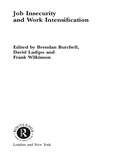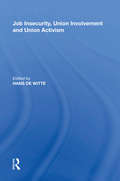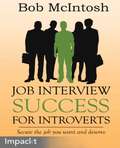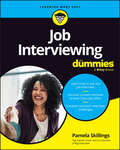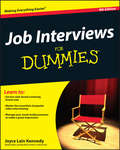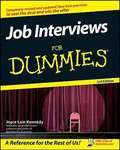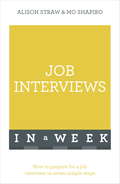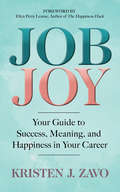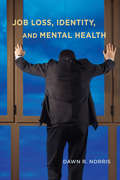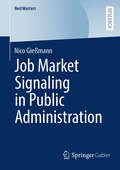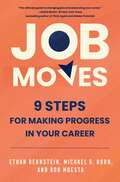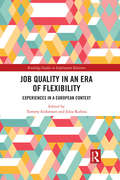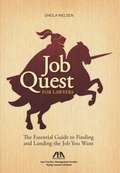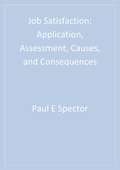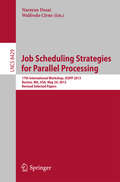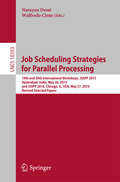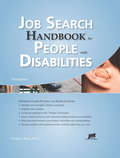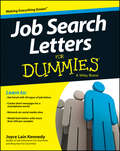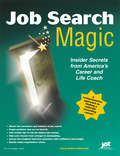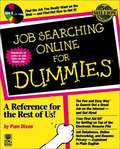- Table View
- List View
Job Insecurity and Work Intensification (Routledge Studies In Employment Relations Ser.)
by Frank Wilkinson Brendan Burchell David LadipoBased on findings of the recently published Joseph Rowntree Report, this book provides an up-to-the-minute review of current research on flexibility, job insecurity and work intensification. It examines the impact of these developments on individuals, their families, the workplace and the long-term health of the British economy, as well as an analy
Job Insecurity, Union Involvement and Union Activism
by Hans De WitteThis volume contains empirical analyses of European psychologists and sociologists on the impact of job insecurity on trade union membership, activism and upon the attitudes of individual workers towards unions. Little is currently known about the impact of job insecurity on the union participation of workers, which is significant given the importance of trade unions in European collective bargaining systems. This volume reports innovative and pioneering research on this research gap. It answers questions such as: do workers more easily join unions because of job insecurity, or does it make them leave the union? Does it influence participation in work's council elections or affect the intention to become a union activist? And are workers less satisfied and less committed to their unions when they experience job insecurity? The book contains recommendations for policy makers, social partners and practitioners in the field of work and organizations.
Job Interview Success for Introverts
by Bob McintoshAs an introvert, you may feel that extraverts have it easy when searching for their dream job. Introversion is something to be overcome if you want that role, right? Wrong – the way introverts work and behave, far from being an obstacle, can actually be immensely effective in the interview process. This is precisely what this quick guide from Bob McIntosh demonstrates. Taking you through the entire interview process, from your initial job searching and networking to the interview itself, you will see how your working style preferences can be utilized – and indeed, optimized - to prepare you for success.
Job Interviewing For Dummies
by Pamela SkillingsBoost your confidence, ace your interview, and get the job Job Interviewing For Dummies will teach you how to prepare for your next job interview, deal with tough questions, and gain the tools and skills to interview with confidence and poise. This book offers a structured, step-by-step approach for succeeding in virtual and in-person interviews. You’ll find information, strategies, and examples to empower you to present your best self to potential employers. Learn how to anticipate and prepare for the most likely questions, regardless of your level or industry, and be prepared for anything—an interview on short notice, explaining gaps on your resume, changing careers, and beyond. With examples and stories from the interview trenches, this friendly Dummies guide will help you breathe new life into your job search. Gain the poise you need to own the interview room (or the video chat) Brush up on your interview skills if you haven’t done this in a while Come prepared with impressive answers and questions to ask Overcome common challenges like resume gaps This book is for anyone interested in finding a new job or helping others in their job search. With Job Interviewing For Dummies, be prepared to hear “yes” more often!
Job Interviews For Dummies
by Joyce Lain KennedyDeliver a show-stopping interview performance Does the thought of interviewing for a new job send shivers down your spine? It doesn't have to! Whether you're searching for your first job, changing careers, or looking for advancement in your current line of work, Job Interviews For Dummies shows you how to use your skills and experiences to your advantage and land that job. Following a half-decade characterized by an explosion of economic crises, global expansion, and technological innovation in the job market, today's job seekers vie for employment in a tough era of new realities where few have gone before. In addition to covering how to prepare for an interview, this updated edition explores the new realities of the job market with scenarios that you can expect to encounter, an updated sample question and answer section, coverage of how you can harness social media in your job search, information on preparing for a Web-based interview, and the best ways to keep your credibility when applying for several jobs at once. Out-prepare the competition Overcome your fear of interviewing Ask smart questions about the job and the employer Give the best answers to make-or-break questions Fit your qualifications to the job's requirements Dress like an insider Survive personality tests Interview across cultures Evaluate a job offer Negotiate a better salary Whether you're fresh from the classroom, a prime-timer over 50, or somewhere in between, Job Interviews For Dummies quickly gets you up to speed on the skills and tools you need to land the job you want.
Job Interviews For Dummies
by KennedyJob interviews are crucial meetings that seal the deal on who getshired. But, since the previous edition of Job Interviews forDummies was published, everything about the interview processhas changed in ways you need to know about and get comfortable withbeforehand. This completely revised and updated 3rd Editionbrings you fully up to speed with the latest technological changes,interview strategies, and negotiation techniques to help you give ashow-stopping performance and land the job of your dreams. Youlearn the secrets of successful Internet video interviewing andfind out how to present yourself on a global scale. And,you'll get plenty of expert advice on giving targetedresponses, pinpointing the critical parts of questions, andfollowing up on the interview. In this outstanding handbook ofcontemporary interview arts, you'll discover how to:Out-prepare the competitionOvercome your fear of interviewingAsk smart questions about the job and the employerGive the best answers to make-or-break questionsFit your qualifications to the job's requirementsDress like an insiderSurvive personality testsInterview across culturesDeliver a show-stopping interview performanceEvaluate a job offerNegotiate a better salaryWhether you're fresh from the classroom, a prime-timerover 50, or somewhere in between, Job Interviews For Dummies,3rd Edition gets you up to speed fast on the skillsand tools you need to land the job you want.
Job Interviews In A Week: How To Prepare For A Job Interview In Seven Simple Steps
by Alison Straw Mo ShapiroThe ability to succeed at interviews is crucial to anyone who wants to advance their career.Written by Alison Straw and Mo Shapiro, leading experts on interviews as both coaches and practitioners, this book quickly teaches you the insider secrets you need to know to in order to perform brilliantly when interviewed.The highly motivational 'in a week' structure of the book provides seven straightforward chapters explaining the key points, and at the end there are optional questions to ensure you have taken it all in. There are also cartoons and diagrams throughout, to help make this book a more enjoyable and effective learning experience.So what are you waiting for? Let this book put you on the fast track to success!n a week what the experts learn in a lifetime.
Job Interviews In A Week: How To Prepare For A Job Interview In Seven Simple Steps
by Alison Straw Mo ShapiroJob Interviews In A Week is a simple and straightforward guide to success, giving you everything you need to know in just seven short chapters. From understanding the process, doing your research and making yourself memorable, to feeling confident, handling tough questions and knowing what to ask, you'll soon be on track for success. This book introduces you to the techniques of interview success, giving you a thorough knowledge what you need to do to put in a great interview performance. Whether you choose to read it in a week or in a single sitting, Job Interviews In A Week is your fastest route to success:- Sunday: Understand the interview process so you know what to expect.- Monday: Do your research on the interview, the role and the organization so you can demonstrate your knowledge of their requirements.- Tuesday: Discover what differentiates you to make yourself the memorable candidate.- Wednesday: Prepare yourself for success to feel confident in the interview.- Thursday: Respond skilfully and be prepared for interviewers' questions and exercises.- Friday: Decide what questions you want to ask, to demonstrate being proactive.- Saturday: Put it all together and know that you have done all you can towards your success.ABOUT THE SERIESIn A Week books are for managers, leaders, and business executives who want to succeed at work. From negotiating and content marketing to finance and social media, the In A Week series covers the business topics that really matter and that will help you make a difference today. Written in straightforward English, each book is structured as a seven-day course so that with just a little work each day, you will quickly master the subject. In a fast-changing world, this series enables readers not just to get up to speed, but to get ahead.
Job Joy: Your Guide to Success, Meaning, and Happiness in Your Career
by Kristen J. ZavoFind Success and Happiness by Doing Work That Matters.Job Joy author, Kristen Zavo, knows what it’s like to be successful by all outside measures, but still unhappy at work. Over the course of nearly two decades in traditional jobs, she’s tried it all in pursuit of career happiness and fulfillment. In this guide, she passes on the knowledge of her experience, so you can shortcut your way to career happiness. You’ll learn what worked (and what didn’t), and the exact process that she discovered – and now uses with clients – so that they too, can turn things around and once again become excited, passionate and fulfilled at work.Job Joy is the perfect guide for high achievers who feel stuck in their career - unsure of what to do next, and afraid it's too late to do anything different anyway. After reading Job Joy, you will have the tools to:Find meaning at work NOWDo more of what you love and less of what you don’t each day, and still make it to 6pm spin class Determine whether you should stay put or find a new job – or even an entirely new career Overcome the top fears and challenges that are stopping you from making a move – and a difference Create a plan to build a career that has meaning Why let yet another year go by, hoping for change to just happen? Take the first step towards experiencing success, meaning, and happiness in your career – get Job Joy today!
Job Loss, Identity, and Mental Health
by Dawn R. NorrisOur jobs are often a big part of our identities, and when we are fired, we can feel confused, hurt, and powerless--at sea in terms of who we are. Drawing on extensive, real-life interviews, Job Loss, Identity, and Mental Health shines a light on the experiences of unemployed, middle-class professional men and women, showing how job loss can affect both identity and mental health. Sociologist Dawn R. Norris uses in-depth interviews to offer insight into the experience of losing a job--what it means for daily life, how the unemployed feel about it, and the process they go through as they try to deal with job loss and their new identities as unemployed people. Norris highlights several specific challenges to identity that can occur. For instance, the way other people interact with the unemployed either helps them feel sure about who they are, or leads them to question their identities. Another identity threat happens when the unemployed no longer feel they are the same person they used to be. Norris also examines the importance of the subjective meaning people give to statuses, along with the strong influence of society's expectations. For example, men in Norris's study often used the stereotype of the "male breadwinner" to define who they were. Job Loss, Identity, and Mental Health describes various strategies to cope with identity loss, including "shifting" away from a work-related identity and instead emphasizing a nonwork identity (such as "a parent"), or conversely "sustaining" a work-related identity even though he or she is actually unemployed. Finally, Norris explores the social factors--often out of the control of unemployed people--that make these strategies possible or impossible. A compelling portrait of a little-studied aspect of the Great Recession, Job Loss, Identity, and Mental Health is filled with insight into the identity crises that unemployment can trigger, as well as strategies to help the unemployed maintain their mental strength.
Job Market Signaling in Public Administration (BestMasters)
by Nico GießmannThe public sector urgently needs more personnel and must actively engage with the labor market to distinguish itself from the private sector. Scholars recommend developing a strong “public service brand” and using sector-specific motives to attract individuals who prefer public sector employment. However, public-specific signaling often fails to attract a diverse range of applicants. This book examines the signaling strategies in public and private job advertisements and explores how the public sector can emulate private sector appeal while balancing personnel policy trade-offs involved with this manipulation. A linguistic analysis of 5,000 public and private job advertisements was performed to reveal significant sectoral differences in word choice and content emphasis. Further, a preregistered online survey experiment measured the intention to apply to job advertisements with varying signaling intensities. Therefore, this book enhances the understanding of recruitment messaging and strategies to bridge public-private sector differences.
Job Moves: 9 Steps for Making Progress in Your Career
by Ethan Bernstein Michael B. Horn Bob MoestaA USA Today Bestseller“The ultimate guide to changing jobs and advancing your career." —Adam Grant, #1 New York Times bestselling author of Think Again and Hidden Potential, and host of the TED podcast WorkLifeThree innovators offer a road-tested framework for career development that helps anyone make real progress on their path when they switch jobs.Each year, an estimated 1 billion people switch jobs worldwide. A lucky few stumble into the role of their dreams, but hundreds of millions are disappointed. What if, when looking for a job, we could make more informed choices to better select the opportunity we seize? What if the power to move along our career paths lies with each of us, as opposed to hiring managers or the market?According to the “Jobs to Be Done” theory of product design—customers don’t simply buy products; they recruit them to do specific jobs that solve a problem. Job Moves adopts this model to view jobs as positions we “hire” to help us make progress in our lives and careers. Based on research conducted with over a thousand professionals at all stages of their careers, Ethan Bernstein, Michael B. Horn, and Bob Moesta find that this notion bears out no matter your age, stage, or trajectory.Key to this new, universal approach is understanding our priorities at the specific moment when we make each move. This team has created a process to help individuals identify the current circumstances driving them to look for new opportunities, the experiences they hope to gain in a new job, what tradeoffs they’ll gladly make in return, and how to learn-before-switching if a new job will deliver. The result encourages job seekers to look beyond a title or company for a more holistic view and ask not what you can do in a job, but what a potential job can do for you.Full of useful activities and tools, Job Moves offers the timeless framework of our generation to help anyone create a career that will be happier and more fulfilling.
Job Quality in an Era of Flexibility: Experiences in a European Context (Routledge Studies in Employment Relations)
by Tommy Isidorsson Julia KubisaThis is the era of flexibility. Under constant pressure to be adaptable, organizations increasingly adopt employment practices such as zero-hours contracts, the casualization of the workforce and the use of temporary and agency labour. These flexible practices are central to debates about the changing nature of job quality and its causes, trends and consequences. Arguing that job quality is central to understanding contemporary work, this book explores the internal and external pressures for flexibility in workplaces, professions and sectors and how this pressure shapes workers’ experiences of job quality. By studying job quality dynamics via case studies from organizations and occupations in the UK, Poland, Belgium and Sweden, the volumes illustrates the diversity of practices and experiences, as well as market pressures and institutional arrangements which effect working lives. Finally, the editors propose a policy debate on the new concept "flexiquality" - a combination of flexibility and job quality that can be beneficial for both management and workers.
Job Quest for Lawyers: The Essential Guide to Finding and Landing the Job You Want
by Sheila NielsenThis book provides step-by-step guidance that finally makes networking inspiring instead of a chore. The "quest" motif applies to each stage of the job search. The book demystifies networking by including illustrations from the author's own experiences and from the stories of her clients that provide examples of the real world do's and don'ts of how to conduct a productive job search.
Job Satisfaction: Application, Assessment, Causes, and Consequences
by Paul E. SpectorDistilling the vast literature on this frequently studied variable in organizational behaviour research, Paul E Spector provides the student and professional with a pithy overview of the application, assessment, causes and consequences of job satisfaction. In addition to discussing the nature of and techniques for assessing job satisfaction, the author summarizes the findings concerning how people feel towards work, including: cultural and gender differences in job satisfaction and personal and organizational causes; and potential consequences of job satisfaction and dissatisfaction. Students and researchers will particularly appreciate the extensive list of references and the Job Satisfaction Survey included in the Appendix.
Job Satisfaction: From Assessment to Intervention
by Paul E. SpectorDistilling the vast literature on this most frequently studied variable in organizational behavior, Paul E. Spector provides students and professionals with a pithy overview of the research and application of job satisfaction. In addition to discussing the nature of and techniques for assessing job satisfaction, this text summarizes the findings regarding how people feel toward work, including cultural and gender differences in job satisfaction, personal and organizational antecedents, potential consequences, and interventions to improve job satisfaction. Students, researchers, and practitioners will particularly appreciate the extensive list of references and the Job Satisfaction Survey included in the Appendix. This book includes the latest research and new topics including the business case for job satisfaction, customer service, disabled workers, leadership, mental health, organizational climate, virtual work, and work-family issues. Further, paulspector.com features an ongoing series of blog articles, links to assessments mentioned in the book, and other resources on job satisfaction to coincide with this text. This book is ideal for professionals, researchers, and undergraduate and graduate students in industrial and organizational psychology and organizational behavior, as well as in specialized courses on job attitudes or job satisfaction..
Job Satisfaction: From Assessment to Intervention
by Paul E. SpectorDistilling the vast literature on this most frequently studied variable in organizational behavior, Paul E. Spector provides students and professionals with a pithy overview of the research and application of job satisfaction. In addition to discussing the nature of and techniques for assessing job satisfaction, this text summarizes the findings regarding how people feel toward work, including cultural and gender differences in job satisfaction, personal and organizational antecedents, potential consequences, and interventions to improve job satisfaction. Students, researchers, and practitioners will particularly appreciate the extensive list of references and the Job Satisfaction Survey included in the Appendix. This book includes the latest research and new topics including the business case for job satisfaction, customer service, disabled workers, leadership, mental health, organizational climate, virtual work, and work-family issues. Further, paulspector.com features an ongoing series of blog articles, links to assessments mentioned in the book, and other resources on job satisfaction to coincide with this text. This book is ideal for professionals, researchers, and undergraduate and graduate students in industrial and organizational psychology and organizational behavior, as well as in specialized courses on job attitudes or job satisfaction..
Job Scheduling Strategies for Parallel Processing
by Walfredo Cirne Narayan DesaiThis book constitutes the thoroughly refereed post-conference proceedings of the 18th International Workshop on Job Scheduling Strategies for Parallel Processing, JSSPP 2014, held in Phoenix, AZ, USA, in May 2014. The 9 revised full papers presented were carefully reviewed and selected from 24 submissions. The papers cover the following topics: single-core parallelism; moving to distributed-memory, larger-scale systems, scheduling fairness; and parallel job scheduling.
Job Scheduling Strategies for Parallel Processing
by Walfredo Cirne Narayan DesaiThis book constitutes the thoroughly refereed post-conference proceedings of the 18th International Workshop on Job Scheduling Strategies for Parallel Processing, JSSPP 2014, held in Phoenix, AZ, USA, in May 2014. The 9 revised full papers presented were carefully reviewed and selected from 24 submissions. The papers cover the following topics: single-core parallelism; moving to distributed-memory, larger-scale systems, scheduling fairness; and parallel job scheduling.
Job Sculpting: The Art of Retaining Your Best People
by James Waldroop Timothy ButlerHiring good people is tough, but keeping them can be even tougher. The professionals streaming out of today's MBA programs are so well educated and achievement oriented that they could do well in virtually any job. But will they stay? According to noted career experts Timothy Butler and James Waldroop, only if their jobs fit their deeply embedded life interests--that is, their long-held, emotionally driven passions. Butler and Waldroop identify the eight different life interests of people drawn to business careers and introduce the concept of job sculpting, the art of matching people to jobs that resonate with the activities that make them truly happy. Managers don't need special training to job sculpt, but they do need to listen more carefully when employees describe what they like and dislike about their jobs. Once managers and employees have discussed deeply embedded life interests--ideally, during employee performance reviews--they can work together to customize future work assignments. In some cases, that may mean simply adding another assignment to existing responsibilities. In other cases, it may require moving that employee to a new position altogether. Skills can be stretched in many directions, but if they are not going in the right direction--one that is congruent with deeply embedded life interests--employees are at risk of becoming dissatisfied and uncommitted. And in an economy where a company's most important asset is the knowledge, energy, and loyalty of its people, that's a large risk to take.
Job Search Handbook for People with Disabilities: A Complete Career Planning and Job Search Guide (Third Edition)
by Daniel J. Ryan<p>This extensive handbook shows people with disabilities how to overcome obstacles they encounter when searching for employment. Readers learn how to identify their strengths, explore career options, and navigate the hidden job market. They also gain tips for writing resumes, cover letters, and other forms of job search communication, as well as guidance for performing well in interviews. <p><i>Job Search Handbook for People with Disabilities</i> features helpful information on employment laws and the rights they provide. It teaches readers when and how to disclose disabilities to a potential employer and lends additional guidance for success on the job.</p>
Job Search Letters For Dummies
by KennedyNew-style job messages that get you in the door and on your way upFrom sparkling cover letters to six-word bios, a fresh bevy of job search letters has grown powerfully useful for successful career communications. Job Search Letters For Dummies delivers the quality of New Era know-how you need right now to land good jobs and thrive. Whether you're a long-time professional or a recent college graduate -- or somewhere in between -- Job Search Letters For Dummies has you covered.Job Search Letters For Dummies covers the gamut of leading-edge topics, including effective strategies for internal career communications on topics such as raises, promotions, and position changes; rules for communicating professionally with texts and networking on social media platforms such as twitter and LinkedIn; fresh and updated communication phrases to voice accomplishments and make job-fit statements; post-interview etiquette and letters such as thank-yous, "hire me" reinforcement notes, interest revival queries; and much more.Get hired with 40 types of job lettersCreate short messages for a smartphone worldNetwork on social media sitesModel best letters more than 200 pro samplesWhether you're a long-time professional or a recent college graduate -- or somewhere in between -- Job Search Letters For Dummies has you covered.A note to job seekers from nationally syndicated careers columnist and author or Job Search Letters For Dummies, Joyce Lain Kennedy:Welcome aboard, job seekers! Thanks for checking out this first guide to communications-supported job search and career growth in relentlessly changing technological times. The right messaging -- what you say, why you say it, and when you say it -- is as important today to your employment goals as it has been at any time since Leonardo da Vinci wrote the first professional resume in 1482. Consider recent job-finding history:In 1986 fax machines and postal mail were the most popular ways to send resumes and cover letters.In the 1990s the Internet boom kicked in with new tools to connect jobs and people: e-mail, websites, cell phones, mailing lists, and online bulletin boards.In the 21st century the double-time march of recruiting technology skyrocketed, building a techno-swamp populated with endless ideas of how to connect work and people through smartphones, wonder tablets, apps, and social media for virtual networking. You're competing in a new world of work out there. If your job search is treading water -- or even drowning-- there's a better way. Make a splash! Engage hiring authorities through a communications-centered campaign with smart content.
Job Search Magic
by Susan Britton WhitcombIncludes sample resumes and cover letters, before-and-after interview responses, career-choice guidance, helpful job search Web sites, salary-negotiation tips, job success tips, and much, much more!
Job Searching Online for Dummies
by Pam DixonReady for a job that's perfect for you? Before you pound the pavement, surf the Net. More than just a list of Web sites, Job Searching Online for Dummies explains how to scope out potential employers on the Internet, network online, create and send an electronic resume that really stands out, design your own self-promoting Web site, and get that ideal job. Inside, find helpful advice on how to: *Conduct a well-informed job search using online resources *Build an electronic resume that best presents your skills *Post and send your e-resume and cover letter successfully *Network effectively in cyberspace - and make contacts with peers and employers *Create a dynamic Web page that really markets your talents *Tour the top job databases and check out corporate culture online *Keep your job search confidential and your personal information private.
